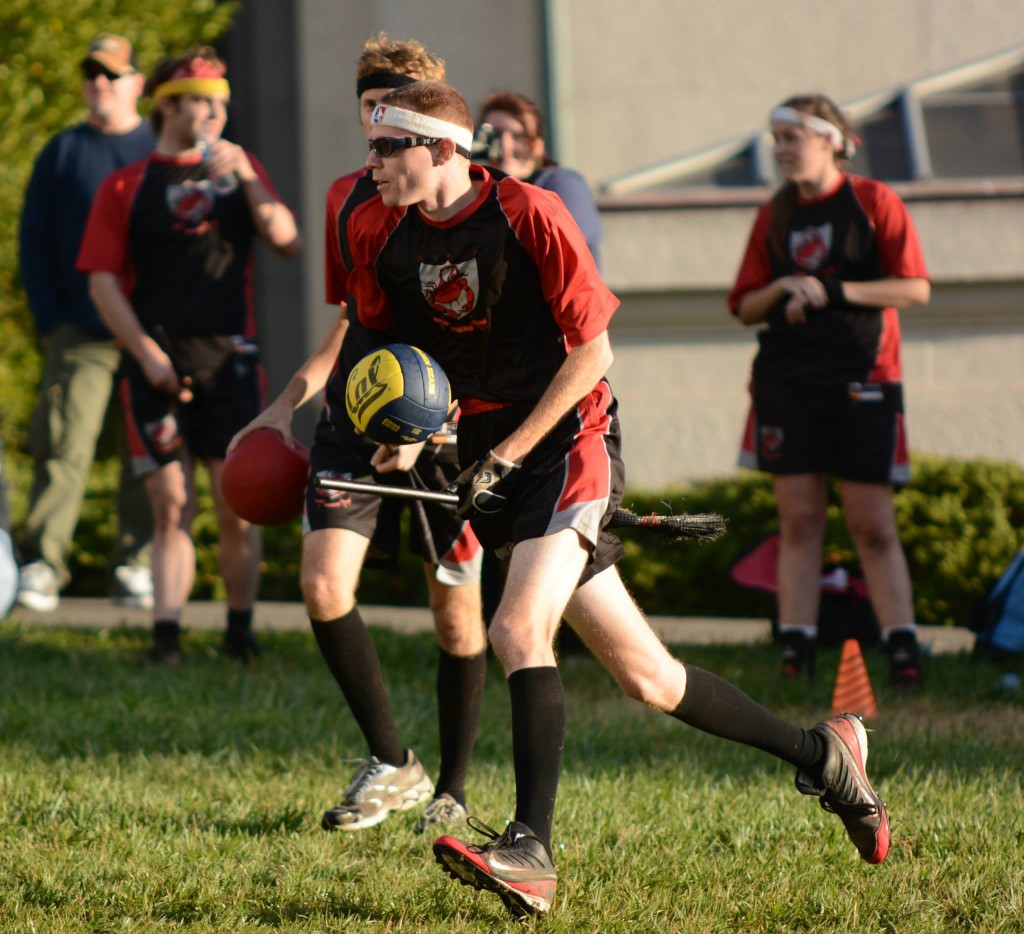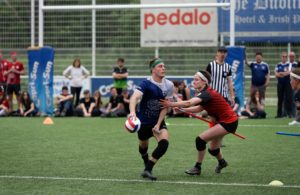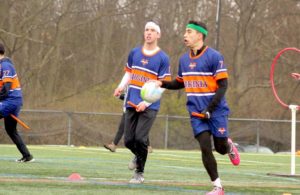- Rule, Britannia, no more?
- Unpopular Opinions: US Quadball Cup 2023
- Proven Contenders: University of Virginia
- Proven Contenders: Rutgers University
- Proven Contenders: University of Michigan
- Proven Contenders: Creighton University
- Different Perspectives: A Look Inside USA Ultimate
- Antwerp QC, Much of Belgian Core, Leaves Competitive Quidditch
Butterfly Effect: Last Man on the Bench
- By Kevin Oelze
- Updated: March 14, 2016

Credit: JH Photography
Keeper Andrew Covel stopped suddenly to avoid a bludger in flight before quickly passing the quaffle to a breaking Alex Makk, who scored. Just one possession before, Covel had fired a long shot that passed through Boston University’s middle hoop, giving the Silicon Valley Skrewts a 10-0 lead. The Last Western team alive in World Cup VII was now up 20-0 on the heavily favored Northeast champion.
Miraculously, the Skrewts surpassed even championship favorite Lost Boys Quidditch Club, and celebrated the West region’s deepest World Cup run despite being the very last team to punch their ticket to Myrtle Beach. It’s easy to forget now just how dire the situation seemed when the Skrewts fought to qualify on that rainy weekend in Phoenix, and how the team was saved, in part, by the last player on their roster.
A year earlier at World Cup VI in Kissimmee, the Skrewts qualified for bracket play by utilizing a small number of talented players. The squad’s quaffle game flowed through the hands of keeper Kevin Oelze and standout chaser Greg Weber, while its beater game was powered by the steadfast duo of Willis Miles IV and Kyrie Timbrook. Unfortunately, going into the 2013-14 season, Weber’s career was cut short by a badly broken arm, and Oelze was sidelined by a herniated disc which would ultimately keep him out for the first half of the year. Thus, the Skrewts were stuck scrambling and rebuilding around the pairing of Timbrook and Miles while many of its less prominent chasers were forced into larger roles. The strategy had dubious success, as the Skrewts mostly limped into the West Regional Championship, having suffered pretty bad losses to most of the better teams in the region.
Yet the Skrewts looked good for most of the first day of their regional. The team put up a dominant 130*-20 win over the Utah Crimson Fliers, a team that would ultimately qualify for World Cup. It followed that with a 120*-30 drubbing of a relatively new University of Arizona team and then shut out Boise State University 130*-0 to take a 3-0 record into the last game of pool play. Then, facing the top team in its pool, Arizona State University, the Skrewts managed to keep the game tied 30-30 as the snitch neared release. Unfortunately, from there, the wheels came off. They allowed 60 unanswered points to Arizona State before pulling the snitch to take a 90-60* loss. Still, the Skrewts just needed to win their first bracket play game to earn their spot on the national stage. Unfortunately, they were unable to secure the win against a new Long Beach Funky Quaffle squad, losing 130*^-100, despite the Skrewts’s out-of-range lead for most of the game. . Falling to the lower bracket, they barely staved off elimination with a 80*-60 win over Riverside Quidditch. The Skrewts only needed to win one of their next two games to make bracket.
First, they faced off against a Stanford University team they’d historically dominated, but the tables turned on the Skrewts, as they were nearly pushed out of snitch range the entire game. While they were able to crawl back into range, Stanford pulled the snitch to defeat the Skrewts 100*-40.
Everything came down to one last game against UCLA’s B-team, the Wizards of Westwood. The Skrewts jumped out to 30-0 lead and seemed well-positioned to confirm their trip to Myrtle Beach before everything fell apart. Over the next 9 minutes, the Wizards were able to run off four straight goals as the Skrewts seemed poised to fail their run through the Glendale Gauntlet. Desperate, Oelze, who was coaching the Skrewts during his injury, looked down the bench for anyone who would give their all to make a play the team desperately needed. Enter Martin Pyne.
For anyone who has ever met Pyne, “athlete” is not the first word that jumps to mind. Pyne is maybe 135 pounds soaking wet, and he’s best known in the quidditch community for his work on Quidditch Reference and on the IQA, now USQ, Gameplay team. He is a hard worker and an amazing teammate, but is generally better known for his contributions off the pitch rather than on. Sometimes, though, all you need to triumph is determination and hard work. With the game spiraling away, Pyne managed to latch his arm onto the Wizards’ keeper, forcing a pass to a chaser who was quickly tackled by Skrewts chaser Forrest Stone. As the ball fell loose, Pyne won the scramble for it against the opposing keeper. As they raced down the field, Pyne stayed a step ahead and pushed the ball through for the tying goal. The Wizards were able to score two more goals before Skrewts seeker Igor Gorbatok made the winning grab with a final margin of 70*-60. Those ten points were decided by a goal from the last player on the bench.
From there, the Skrewts’ season turned itself around. Transfers Alex Makk and Sam Harris revitalized the team’s quaffle game, as did the return of a healthy Oelze in the second half of the year. The team that competed at World Cup was an extremely different team from the one that escaped regionals that year. Still, it’s easy to look at that season and forget that everything would have been different if not for one singular play from the last player you’d expect.
If you have an idea for or would like to contribute to an article in this series, please email butterfly.effect@eighthman.com.
Related Posts
About Kevin Oelze
Kevin is the co-founder and technical director of The Eighth Man. In his off time, he masquerades as a software engineer, and actively participates in karaoke duels. Despite the rules calling for Jason Mraz-only duels, his go-to song is ""Brighter than Sunshine"" by Aqualung.



